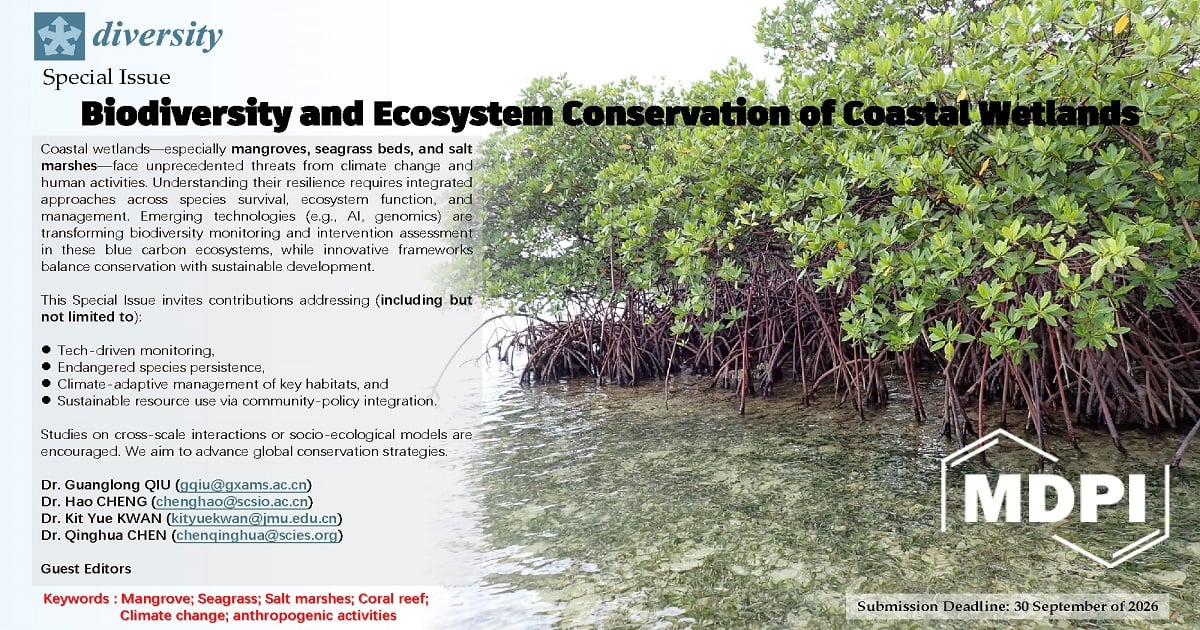- 2.1Impact Factor
- 4.0CiteScore
- 18 daysTime to First Decision
Biodiversity and Ecosystem Conservation of Coastal Wetlands
This special issue belongs to the section “Biodiversity Conservation“.
Special Issue Information
Dear Colleagues,
Coastal wetlands—particularly mangrove forests, seagrass beds, and salt marshes—represent critical biodiversity hotspots facing unprecedented pressures from climate change, habitat fragmentation, and anthropogenic activities. Understanding their ecological resilience requires integrated approaches spanning species survival mechanisms, ecosystem functionality, and sustainable management. Emerging technologies—such as AI-driven monitoring, genomic tools, and sky-land-sea integrated systems—are revolutionizing how we quantify biodiversity dynamics and intervention efficacy in these blue carbon ecosystems. Concurrently, the urgent need to reconcile conservation with human development demands innovative frameworks for ecological restoration and resource utilization.
This Special Issue highlights coastal wetland biodiversity as a model system for interdisciplinary research. We invite contributions addressing (including but not limited to):
- Technological innovation in species/habitat monitoring,
- Mechanisms of population persistence for endangered species,
- Climate-adaptive ecosystem management, and
- Sustainable resource use through community engagement and policy integration.
Studies elucidating cross-scale interactions (gene-to-landscape), novel conservation interventions, or socio-ecological co-benefit models are particularly encouraged. This collection aims to advance knowledge and actionable strategies for safeguarding these vital ecosystems globally.
Dr. Guanglong Qiu
Dr. Hao Cheng
Dr. Kit Yue Kwan
Dr. Qinghua Chen
Guest Editors
Manuscript Submission Information
Manuscripts should be submitted online at www.mdpi.com by registering and logging in to this website. Once you are registered, click here to go to the submission form. Manuscripts can be submitted until the deadline. All submissions that pass pre-check are peer-reviewed. Accepted papers will be published continuously in the journal (as soon as accepted) and will be listed together on the special issue website. Research articles, review articles as well as short communications are invited. For planned papers, a title and short abstract (about 250 words) can be sent to the Editorial Office for assessment.
Submitted manuscripts should not have been published previously, nor be under consideration for publication elsewhere (except conference proceedings papers). All manuscripts are thoroughly refereed through a single-blind peer-review process. A guide for authors and other relevant information for submission of manuscripts is available on the Instructions for Authors page. Diversity is an international peer-reviewed open access monthly journal published by MDPI.
Please visit the Instructions for Authors page before submitting a manuscript. The Article Processing Charge (APC) for publication in this open access journal is 2100 CHF (Swiss Francs). Submitted papers should be well formatted and use good English. Authors may use MDPI's English editing service prior to publication or during author revisions.
Keywords
- mangrove
- seagrass
- salt marshes
- climate change
- anthropogenic activities

Benefits of Publishing in a Special Issue
- Ease of navigation: Grouping papers by topic helps scholars navigate broad scope journals more efficiently.
- Greater discoverability: Special Issues support the reach and impact of scientific research. Articles in Special Issues are more discoverable and cited more frequently.
- Expansion of research network: Special Issues facilitate connections among authors, fostering scientific collaborations.
- External promotion: Articles in Special Issues are often promoted through the journal's social media, increasing their visibility.
- e-Book format: Special Issues with more than 10 articles can be published as dedicated e-books, ensuring wide and rapid dissemination.

